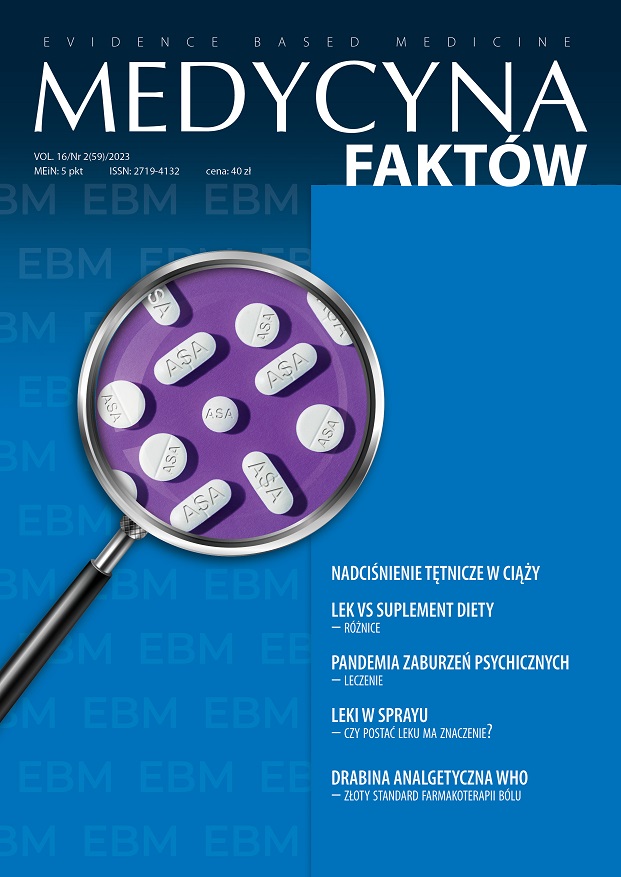Treatment and prevention of vitamin D3 deficiency – case reports Case report
Main Article Content
Abstract
Vitamin D deficiency occurs in all age groups, particularly at risk are those staying in buildings at daytime, as well as elderly and obese ones. Supplementation should last from October to March, or all year round. The patient’s vitamin D level is represented by level of 25(OH)D. It primarily influences therapeutic decisions. The article discusses recommendations for the current principles of vitamin D supplementation. We have presented also three clinical cases.
Article Details
How to Cite
Sapilak, B. J. (2023). Treatment and prevention of vitamin D3 deficiency – case reports. Medycyna Faktow (J EBM), 16(2(59), 274-277. https://doi.org/10.24292/01.MF.0223.23
Issue
Section
Articles
Copyright © by Medical Education. All rights reserved.
References
1. Karczmarewicz E, Łukaszkiewicz J, Lorenc R. Vitamin D – metabolism, action, requirements and treatment strategies. Standardy Medyczne. 2007; 4: 137-42.
2. Polzonetti V, Pucciarelli S, Vincenzetti S et al. Dietary Intake of Vitamin D from Dairy Products Reduces the Risk of Osteoporosis. Nutrients. 2020; 12(6): 1743. http://doi.org/10.3390/nu12061743.
3. Karczmarewicz E, Czekuć-Kryśkiewicz E, Płudowski P. Effect of vitamin D status on pharmacological treatment efficiency – impact on cost-effective management in medicine. Dermatoendocrinology. 2013; 5: 299-304.
4. Napiórkowska L, Franek E. Rola oznaczania witaminy D w praktyce klinicznej. Choroby Serca i Naczyń. 2009; 6(4): 203-10.
5. Rusińska A, Płudowski P, Walczak M et al. Zasady suplementacji i leczenia witaminą D – nowelizacja 2018 r. Postępy Neonatologii. 2018; 24(1): 531-59.
6. Hathcock JN, Shao A, Vieth R et al. Risk assessment for vitamin D. Am J Clin Nutr. 2007; 85(1): 6-18. http://doi.org/10.1093/ajcn/85.1.6.
2. Polzonetti V, Pucciarelli S, Vincenzetti S et al. Dietary Intake of Vitamin D from Dairy Products Reduces the Risk of Osteoporosis. Nutrients. 2020; 12(6): 1743. http://doi.org/10.3390/nu12061743.
3. Karczmarewicz E, Czekuć-Kryśkiewicz E, Płudowski P. Effect of vitamin D status on pharmacological treatment efficiency – impact on cost-effective management in medicine. Dermatoendocrinology. 2013; 5: 299-304.
4. Napiórkowska L, Franek E. Rola oznaczania witaminy D w praktyce klinicznej. Choroby Serca i Naczyń. 2009; 6(4): 203-10.
5. Rusińska A, Płudowski P, Walczak M et al. Zasady suplementacji i leczenia witaminą D – nowelizacja 2018 r. Postępy Neonatologii. 2018; 24(1): 531-59.
6. Hathcock JN, Shao A, Vieth R et al. Risk assessment for vitamin D. Am J Clin Nutr. 2007; 85(1): 6-18. http://doi.org/10.1093/ajcn/85.1.6.

